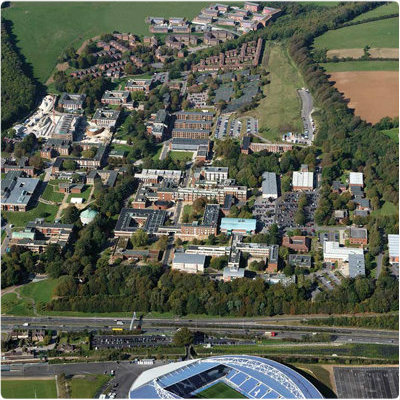 In 2013, the Society for General Microbiology's Autumn Conference took place at the University of Sussex, located near the seaside town of Brighton, famed for its cafes, the historic Lanes, and the world famous Royal Pavillion. This exciting conference aimed to appeal to microbiologists from a variety of different backgrounds, especially those interested in infectious disease. Symposia over the three days covered many different areas of microbiology, including prokaryote and eukaryote research.
In 2013, the Society for General Microbiology's Autumn Conference took place at the University of Sussex, located near the seaside town of Brighton, famed for its cafes, the historic Lanes, and the world famous Royal Pavillion. This exciting conference aimed to appeal to microbiologists from a variety of different backgrounds, especially those interested in infectious disease. Symposia over the three days covered many different areas of microbiology, including prokaryote and eukaryote research.
Please see the at-a-glance tables for an overview of the conference programme:
Impact of bacteriophage in the environment will cover the increasing awareness and impact of bacteriophage on the ecology of the biosphere, while Microbial modulation of cellular responses will highlight the way different bacterial toxins and effectors subvert, inhibit or activate host-cell pathways to the benefit of pathogens. Pathogen genomics – current clinical applications will show how clinical practice is changing based on the data generated by next generation sequencing technology, and Regulatory phosphate-based molecules will outline progress in understanding the actions of phosphate-based regulatory molecules.
The Society for General Microbiology and the British Society for Medical Mycology hosted a joint symposium on fungal diseases, diagnosis and drug discovery. The programme spanned contributions from world-leading scientists on the major human fungal pathogens such as Aspergillus, Candida, Cryptococcus, dermatophytes and plant pathogens, as well the latest diagnostic techniques and advances in drug discovery. Microbial survival in the host
 showcased the diverse strategies mounted by fungal and parasitic pathogens to survive within the human host.
showcased the diverse strategies mounted by fungal and parasitic pathogens to survive within the human host.
In September 2013, the Microbiology Society is joining forces with the British Society for Medical Mycology to present a joint symposium on Fungal Diseases, Diagnosis and Drug discovery on the first two days of the scheduled conference. The program spans contributions from world-leading scientists on the major fungal pathogens such as Aspergillus spp., Candida spp., dermatophytes, Cryptococcus spp. and plant pathogens as well the latest diagnostic techniques and advances in drug discovery.
This symposium will discuss the increasing awareness and impact of bacteriophage on the ecology of the biosphere. Phage are ubiquitous in the environment, being isolated from any environment in which bacteria can survive. Whilst their influence on the evolution of several medically relevant pathogens has been well documented, their role within ecologically distinct niches is less clear. This symposium will consider the role of bacteriophage on bacterial adaptation to a wide variety of environmental niches.
Martha Clokie, Graeme Nicol, Gillian Douce and Nicola Stonehouse
Microbes of diverse genera have evolved strategies to subvert, inhibit or activate processes within host cells. Such modulation plays key roles in pathogenic and symbiotic interactions and can involve delivery of microbial proteins into host cells by various routes. This symposium focuses on prokaryotic exotoxins as well as proteins that are injected into eukaryotic cells via specialised bacterial Type III and IV secretion systems or by other mechanisms. Research in this area has helped to unravel the basis of microbial virulence as well as aspects of host cell biology. The symposium brings together world-leading researchers and provides a forum for early-stage researchers to share their findings in this vibrant area of microbiology.
David Smith, Mark Stevens and Kim Hardie
In September 2013, the Microbiology Society is joining forces with the British Society for Medical Mycology to present a joint symposium on Fungal Diseases, Diagnosis and Drug discovery on the first two days of the scheduled conference. The program spans contributions from world-leading scientists on the major fungal pathogens such as Aspergillus spp., Candida spp., dermatophytes, Cryptococcus spp. and plant pathogens as well the latest diagnostic techniques and advances in drug discovery.
This symposium will discuss the increasing awareness and impact of bacteriophage on the ecology of the biosphere. Phage are ubiquitous in the environment, being isolated from any environment in which bacteria can survive. Whilst their influence on the evolution of several medically relevant pathogens has been well documented, their role within ecologically distinct niches is less clear. This symposium will consider the role of bacteriophage on bacterial adaptation to a wide variety of environmental niches.
Martha Clokie, Graeme Nicol, Gillian Douce and Nicola Stonehouse
Microbes of diverse genera have evolved strategies to subvert, inhibit or activate processes within host cells. Such modulation plays key roles in pathogenic and symbiotic interactions and can involve delivery of microbial proteins into host cells by various routes. This symposium focuses on prokaryotic exotoxins as well as proteins that are injected into eukaryotic cells via specialised bacterial Type III and IV secretion systems or by other mechanisms. Research in this area has helped to unravel the basis of microbial virulence as well as aspects of host cell biology. The symposium brings together world-leading researchers and provides a forum for early-stage researchers to share their findings in this vibrant area of microbiology.
David Smith, Mark Stevens and Kim Hardie
In September 2013, the Microbiology Society is joining forces with the British Society for Medical Mycology to present a joint symposium on Fungal Diseases, Diagnosis and Drug discovery on the first two days of the scheduled conference. The program spans contributions from world-leading scientists on the major fungal pathogens such as Aspergillus spp., Candida spp., dermatophytes, Cryptococcus spp. and plant pathogens as well the latest diagnostic techniques and advances in drug discovery.
This symposium will discuss the increasing awareness and impact of bacteriophage on the ecology of the biosphere. Phage are ubiquitous in the environment, being isolated from any environment in which bacteria can survive. Whilst their influence on the evolution of several medically relevant pathogens has been well documented, their role within ecologically distinct niches is less clear. This symposium will consider the role of bacteriophage on bacterial adaptation to a wide variety of environmental niches.
Martha Clokie, Graeme Nicol, Gillian Douce and Nicola Stonehouse
Microbes of diverse genera have evolved strategies to subvert, inhibit or activate processes within host cells. Such modulation plays key roles in pathogenic and symbiotic interactions and can involve delivery of microbial proteins into host cells by various routes. This symposium focuses on prokaryotic exotoxins as well as proteins that are injected into eukaryotic cells via specialised bacterial Type III and IV secretion systems or by other mechanisms. Research in this area has helped to unravel the basis of microbial virulence as well as aspects of host cell biology. The symposium brings together world-leading researchers and provides a forum for early-stage researchers to share their findings in this vibrant area of microbiology.
David Smith, Mark Stevens and Kim Hardie
In September 2013, the Microbiology Society is joining forces with the British Society for Medical Mycology to present a joint symposium on Fungal Diseases, Diagnosis and Drug discovery on the first two days of the scheduled conference. The program spans contributions from world-leading scientists on the major fungal pathogens such as Aspergillus spp., Candida spp., dermatophytes, Cryptococcus spp. and plant pathogens as well the latest diagnostic techniques and advances in drug discovery.
This symposium will discuss the increasing awareness and impact of bacteriophage on the ecology of the biosphere. Phage are ubiquitous in the environment, being isolated from any environment in which bacteria can survive. Whilst their influence on the evolution of several medically relevant pathogens has been well documented, their role within ecologically distinct niches is less clear. This symposium will consider the role of bacteriophage on bacterial adaptation to a wide variety of environmental niches.
Martha Clokie, Graeme Nicol, Gillian Douce and Nicola Stonehouse
Microbes of diverse genera have evolved strategies to subvert, inhibit or activate processes within host cells. Such modulation plays key roles in pathogenic and symbiotic interactions and can involve delivery of microbial proteins into host cells by various routes. This symposium focuses on prokaryotic exotoxins as well as proteins that are injected into eukaryotic cells via specialised bacterial Type III and IV secretion systems or by other mechanisms. Research in this area has helped to unravel the basis of microbial virulence as well as aspects of host cell biology. The symposium brings together world-leading researchers and provides a forum for early-stage researchers to share their findings in this vibrant area of microbiology.
David Smith, Mark Stevens and Kim Hardie
Most of us are getting used to the revolution in sequencing technology that has now surpassed all our expectations in terms of cost, rapidity and accuracy. Quietly, the focus of this revolution has transitioned from a more academic pursuit to one that promises to be the biggest step change in healthcare practice since the invention of in vitro culture. This is largely the result of the sequencing industry targeting health care as a priority market and designing and manufacturing appropriate machines. Hence the costs and the sample-to-sequence turn-around times are becoming more appropriate for this setting than has been the case in the past. However, it is also true to say that the demand to implement sequence-based approaches for diagnostics, epidemiology and surveillance is also coming from the healthcare side, following many high profile examples of how the resolution afforded by whole genome data can be used to unravel outbreaks and track changes in pathogens through human populations in near to real time and to a level not previously thought possible. This symposium will aim to provide a very practical account of the efforts to implement genomics into the National Health system to provide an unprecedented view of infectious disease. The session will use appropriate examples to illustrate key areas where genomics could be, or already is, of impact. It will aim to highlight the possibilities for rapid diagnosis, dissecting outbreaks by ruling patients in and out, as well as addressing the long-term benefits of this approach for human health at the population level and for the single patient. Novel pathogen discovery will also be considered for unattributed illnesses, as well as microbial interactions within the host and the use of genomics to monitor the impact changes in healthcare practice have on the pathogens themselves. The talks in this session will appeal to scientists and clinician alike.
Nick Thomson, Stephen Gillespie, Jo Jefferies and Ross Fitzgerald
Pathogenic microbes employ diverse and elaborate mechanisms to evade or hijack the host immune system. To persist and thrive within the host, such pathogens must also be able to sense and rapidly respond to changing and often hostile microenvironments found within different body locations. This symposium brings together leaders in the field to showcase the varied mechanisms underlying immune evasion and adaptation to host-imposed stresses in both parasitic and fungal pathogens.
Jan Quinn, Olivier Sparagano, Richard McCulloch and Carol Munro
Most of us are getting used to the revolution in sequencing technology that has now surpassed all our expectations in terms of cost, rapidity and accuracy. Quietly, the focus of this revolution has transitioned from a more academic pursuit to one that promises to be the biggest step change in healthcare practice since the invention of in vitro culture. This is largely the result of the sequencing industry targeting health care as a priority market and designing and manufacturing appropriate machines. Hence the costs and the sample-to-sequence turn-around times are becoming more appropriate for this setting than has been the case in the past. However, it is also true to say that the demand to implement sequence-based approaches for diagnostics, epidemiology and surveillance is also coming from the healthcare side, following many high profile examples of how the resolution afforded by whole genome data can be used to unravel outbreaks and track changes in pathogens through human populations in near to real time and to a level not previously thought possible. This symposium will aim to provide a very practical account of the efforts to implement genomics into the National Health system to provide an unprecedented view of infectious disease. The session will use appropriate examples to illustrate key areas where genomics could be, or already is, of impact. It will aim to highlight the possibilities for rapid diagnosis, dissecting outbreaks by ruling patients in and out, as well as addressing the long-term benefits of this approach for human health at the population level and for the single patient. Novel pathogen discovery will also be considered for unattributed illnesses, as well as microbial interactions within the host and the use of genomics to monitor the impact changes in healthcare practice have on the pathogens themselves. The talks in this session will appeal to scientists and clinician alike.
Nick Thomson, Stephen Gillespie, Jo Jefferies and Ross Fitzgerald
This symposium will outline progress in understanding the actions of phosphate-based regulatory molecules, with a focus on (p)ppGpp, polyphosphates and cyclic di-nucleotides. These regulators have widespread effects on gene expression in bacteria and affect diverse phenotypes. It is becoming clear that these 'global' regulatory molecules often overlap in genes regulated and progress will be presented on the latest developments to characterise the regulatory systems.
Petra Oyston and Geertje Van Keulen
Pathogenic microbes employ diverse and elaborate mechanisms to evade or hijack the host immune system. To persist and thrive within the host, such pathogens must also be able to sense and rapidly respond to changing and often hostile microenvironments found within different body locations. This symposium brings together leaders in the field to showcase the varied mechanisms underlying immune evasion and adaptation to host-imposed stresses in both parasitic and fungal pathogens.
Jan Quinn, Olivier Sparagano, Richard McCulloch and Carol Munro
Most of us are getting used to the revolution in sequencing technology that has now surpassed all our expectations in terms of cost, rapidity and accuracy. Quietly, the focus of this revolution has transitioned from a more academic pursuit to one that promises to be the biggest step change in healthcare practice since the invention of in vitro culture. This is largely the result of the sequencing industry targeting health care as a priority market and designing and manufacturing appropriate machines. Hence the costs and the sample-to-sequence turn-around times are becoming more appropriate for this setting than has been the case in the past. However, it is also true to say that the demand to implement sequence-based approaches for diagnostics, epidemiology and surveillance is also coming from the healthcare side, following many high profile examples of how the resolution afforded by whole genome data can be used to unravel outbreaks and track changes in pathogens through human populations in near to real time and to a level not previously thought possible. This symposium will aim to provide a very practical account of the efforts to implement genomics into the National Health system to provide an unprecedented view of infectious disease. The session will use appropriate examples to illustrate key areas where genomics could be, or already is, of impact. It will aim to highlight the possibilities for rapid diagnosis, dissecting outbreaks by ruling patients in and out, as well as addressing the long-term benefits of this approach for human health at the population level and for the single patient. Novel pathogen discovery will also be considered for unattributed illnesses, as well as microbial interactions within the host and the use of genomics to monitor the impact changes in healthcare practice have on the pathogens themselves. The talks in this session will appeal to scientists and clinician alike.
Nick Thomson, Stephen Gillespie, Jo Jefferies and Ross Fitzgerald
This symposium will outline progress in understanding the actions of phosphate-based regulatory molecules, with a focus on (p)ppGpp, polyphosphates and cyclic di-nucleotides. These regulators have widespread effects on gene expression in bacteria and affect diverse phenotypes. It is becoming clear that these 'global' regulatory molecules often overlap in genes regulated and progress will be presented on the latest developments to characterise the regulatory systems.
Petra Oyston and Geertje Van Keulen
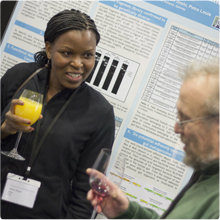 Abstract submissions are now closed. Thank you to all those who submitted an abstract to this year's Autumn Conference. Reviewing will take place after the closing date of Monday 17 June 2013 and you will be advised by Friday 5 July if your abstract has been accepted.
Abstract submissions are now closed. Thank you to all those who submitted an abstract to this year's Autumn Conference. Reviewing will take place after the closing date of Monday 17 June 2013 and you will be advised by Friday 5 July if your abstract has been accepted.
NB: The final decision on acceptance for either a poster or offered oral presentation is at the reviewers’ discretion and due to the large number of abstracts received it is not always possible to accommodate all choices.
The presenting author will need to register to attend the conference by Friday 2 August 2013.
The Abstracts book for the Society for General Microbiology Autumn Conference 2013 is available to download here:
All delegates booked to attend the conference will receive a printed copy of the Abstracts book on registration at the University of Sussex.
(SU01) Microbial modulation of cellular pathways
(SU02) Fungal diseases, diagnostics and drug discovery (joint with BSMM)
(SU03) Impact of bacteriophage in the environment
(SU05) Pathogen genomics – current clinical applications
(SU06) Regulatory phosphate-based molecules
(SU07) Microbial survival in the host
Clinical and medical microbiology
Environment
Fermentation and bioprocessing (industry)
General microbiology
Systems and cells
In order to ensure your presentation runs smoothly, you are asked to comply with the following:
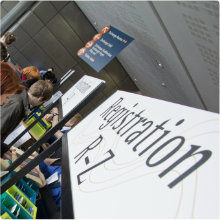
Online registration has now closed.
The Registration Desk was located in the Arts Marquee, situated between the Asa Briggs (A1 and A2) Lecture Theatres (Building 21 on the Campus map) and Library Square. The Registration Desk was open as follows:
You may wish to download the Delegate Registration Form below and bring the completed form with you. Please note, a one-off administration fee of £10 will be applied to onsite bookings.
What's included in your registration fee?
|
Please note: Lapsed members, who have not paid their membership fees for 2013, will not qualify for reduced registration rates. To renew membership or join the Society please contact +44 (0)118 988 1800 or email [email protected]. To qualify for the Society for General Microbiology member rates, membership subscriptions must be paid by Friday 16 August 2013. Grants are available for eligible members of the Society. Click here to find out more. |
|
Registration Category |
Early |
Full |
|
Ordinary Member |
£60 per day |
£70 per day |
|
Associate Member / International Associate Member |
£45 per day |
£55 per day |
|
Postgraduate Student Associate Member |
£45 per day |
£55 per day |
|
Retired / Honorary Member |
- |
£10 per day |
|
Undergraduate Member |
- |
£10 per day |
|
British Society for Medical Mycology (BSMM) Member* |
£60 per day |
£70 per day |
|
Non-Member |
£120 per day |
£130 per day |
|
Accommodation B&B, single en-suite (on campus) |
£60 per night |
|
|
Evening meal (on campus) |
£17 per night |
|
*British Society for Medical Mycology (BSMM) members are welcome to attend the entire meeting at the rate specified.
If you need a letter of invitation for a visa application, we will be happy to supply this after we have received full payment. To find out if you need a visa to visit the UK, please visit the UK Border Agency website.
It is the policy of the Society for General Microbiology not to supply an invitation letter to any delegate without payment and we will not reply to any request from an unregistered delegate. When the delegate has paid, the Conference office will email back a confirmation/receipt letter and, upon request, a letter of invitation, which may be used to obtain the necessary visa.
Please note that all conference delegates are responsible for their own travel and visa arrangements; the Society for General Microbiology will not take any responsibility for travel or visa problems.
An email confirming your booking will be sent within 1 week of receiving your complete registration form.
All registration fees must be paid in full BEFORE arrival at the conference. Any outstanding registration fees must be paid before admittance will be granted to the conference.
The University of Sussex can cater for special dietary requirements that are requested in advance (at least 2 weeks before the conference). Please see General Information for further details.
Neither the organisers, nor the Society will assume any responsibility whatsoever for damage or injury to persons or property during this event. Participants are advised to arrange their own personal travel and health insurance.
Refunds are not provided, however substitutions of attendees can be made at any time by contacting our Conference Office.
After Wednesday 28 August 2013 registrations will only be accepted onsite. You may wish to download the Delegate Registration Form below and bring the completed form with you. Please note, a one-off administration fee of £10 will be applied to onsite bookings.
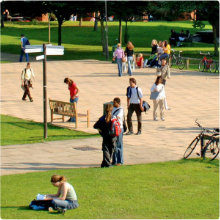 Accommodation on campus is no longer available. If you require accommodation, please visit the University of Sussex website for a list of approved hotels. Alternatively, please see Visit Brighton for accommodation in the area.
Accommodation on campus is no longer available. If you require accommodation, please visit the University of Sussex website for a list of approved hotels. Alternatively, please see Visit Brighton for accommodation in the area.
If you have already booked your accommodation on campus it will be in the Northfield Residence (Building 1 on the Campus map) at the University of Sussex. All rooms are single en-suite arranged in flats of six rooms with a shared kitchen/lounge area. Rooms are charged at £60 per night, including breakfast, which will be served in Dine Central on the first floor of Bramber House (Building 13 on the Campus map) from 07:00-09:00.
Check-in is from 14:00 on the day of arrival and keys should be collected from the Northfield Residence Reception between 14:00-20:00 (labelled 'R' on the Northfield Residence map) on Sunday 1, Monday 2 or Tuesday 3 September. Outside of these times, please collect your key from the 24-hour Reception, York House (Building 10 on the Campus map). Please note, rooms do not automatically lock on closing – please ensure that you lock your room with your key each time you leave your room.
Check-out is by 09:00 on the day of departure and keys should be deposited at the Northfield Residence Reception (labelled 'R' on the Northfield Residence map) or, out of hours, in the large black letterbox on the wall of the Northfield Residence Reception. A luggage store will be available on request – please see your Programme book for details.
For further details on room amenities etc. please visit the University of Sussex website.
Download the Northfield Residence map to locate the Reception and accommodation facilities on campus:
Dinner is charged at £17 per night and, if booked, will be served in Dine Central on the 1st floor of Bramber House (Building 13 on the Campus map) from 18:30-20:30. Please show the back of your conference badge to restaurant staff to obtain your pre-paid meals.
Pay and display parking is in operation in the Visitors' Car Parks on campus from Monday to Friday between 09:00 and 17:00. Please ensure that you display a valid Parking Permit for the duration of your stay.
Please print the Parking Permit below and display it clearly in your car for the duration of your stay.
The nearest car park for Northfield Residence is P9. Please note, there is no parking next to the Northfield Residence Reception or accommodation blocks unless you are a Blue Badge holder.
The conference was held at the University of Sussex.
University of Sussex,
Sussex House,
Brighton,
BN1 9RH
UK
General enquiries: +44 (0)1273 606 755
The conference sessions took place in the Chichester Lecture Theatre, the Asa Briggs (A1 and A2) Lecture Theatres and the Pevensey 1A6 Lecture Theatre (Buildings 24, 21 and 52, respectively, on the Campus map).
Registration, lunch, refreshments, the exhibition and poster viewing sessions were all held in the Arts Marquee located between the Asa Briggs (A1 and A2) Lecture Theatres and Library Square.
Accommodation (if booked on campus) was in Northfield Residence (Building 1 on the Campus map). For further details please see the information on the Accommodation page. Breakfast and dinners (if booked) were in Dine Central on the 1st floor of Bramber House (Building 13 on the Campus map).
For details of the talks and speakers within each symposium, please see the Programme page.
Badges can be collected from 16:00 until 19:00 on Sunday 1 September from the Registration Desk in the Arts Marquee and then on Monday-Tuesday from 08:00-19:00 and Wednesday from 08:00-14:00. The Arts Marquee is located between the Asa Briggs (A1 and A2) Lecture Theatres (Building 21 on the Campus map) and Library Square.
Pay and display parking is in operation in the Visitors' Car Parks on campus from Monday to Friday between 09:00 and 17:00. Please ensure that you display a valid Parking Permit for the duration of your stay.
Please print the Parking Permit below and display it clearly in your car for the duration of your stay.
The University of Sussex can cater for special dietary requirements that are requested in advance (at least 2 weeks before the conference). Please contact [email protected] if you have one of the following special dietary requirements:
 Important information on nut allergies: Regrettably the University of Sussex are unable to cater for people with severe nut allergies. They can, and do, take all reasonable precautions to ensure that the dishes they prepare on site do not contain nuts however they cannot guarantee that traces of nuts will not arise from their supply chain.
Important information on nut allergies: Regrettably the University of Sussex are unable to cater for people with severe nut allergies. They can, and do, take all reasonable precautions to ensure that the dishes they prepare on site do not contain nuts however they cannot guarantee that traces of nuts will not arise from their supply chain.

The University provides free WiFi access on campus. The username and password for use during the conference will be provided on registration at the conference.
Please refer to the University of Sussex Sports and Lifestyle Facilities webpage for more information.
For ideas on where to dine please visit the Visit Brighton website.
For information on the current weather forecast for Brighton please visit BBC Weather.
For further information on what to see and do in the Brighton area please visit the Visit Brighton website.
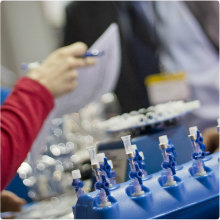 The Society for General Microbiology Autumn Conference 2013 welcomed over 400 delegates from 20 countries to the University of Sussex, 2–4 September. It provided the perfect opportunity for organisations to meet influential researchers and scientists from areas of microbiology including Mycology, Clinical microbiology, Diagnostics, Cell biology, Immunology, Phage biology, Drug discovery and Gene regulation.
The Society for General Microbiology Autumn Conference 2013 welcomed over 400 delegates from 20 countries to the University of Sussex, 2–4 September. It provided the perfect opportunity for organisations to meet influential researchers and scientists from areas of microbiology including Mycology, Clinical microbiology, Diagnostics, Cell biology, Immunology, Phage biology, Drug discovery and Gene regulation.
Opportunities to exhibit, sponsor materials and host stand-alone satellite symposia, gave organisations the chance to engage with individuals involved in the very latest aspects of microbiology.
For full details and to book, please download the Exhibitor and Sponsorship Guide. For the latest list of available space please download the Exhibition Floor Plan.
The main exhibition area was located in the Arts Marquee which also featured:
There were opportunities to talk directly to delegates via a Satellite Symposium session. One session is available on Monday 2 and Tuesday 3 September from 17:40 until 18:10.
Delegate packs were available to all attendees. Organisations were offered the opportunity to include an insert (flyer or sample maximum size A3 folded to A4) within the delegate bags.
Literature was displayed in the exhibition area. Sponsors were able to display A4/A5 literature to all delegates attending the conference.
For further enquiries, please contact the Conference Office.
Exhibitors and Sponsors |
|||
|---|---|---|---|

|

|

|

|

|

|
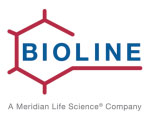
|

|
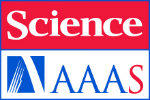
|

|
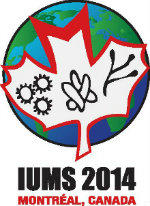
|

|